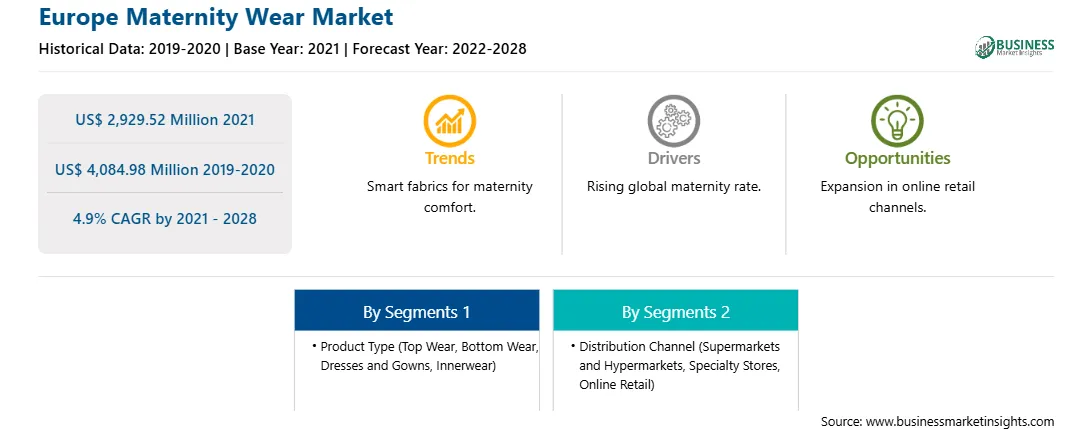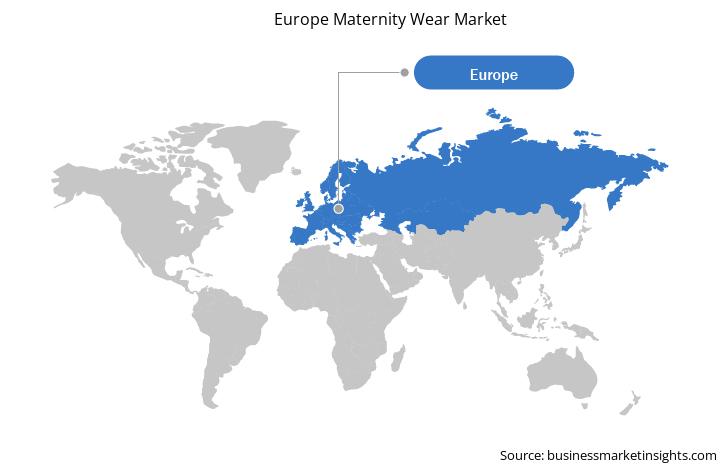Companies in the market adopt various growth strategies, such as product development, market development, market penetration, and diversification, to overcome current and future challenges and drive a company’s growth. On January 20, 2020, Isabella Oliver (a premium maternity brand) adopted the market penetration strategy and launched a new rental program to improve its reach and increase the longevity of maternity clothing. The brand offered its customers a new range of options to rent a dress, including party wear and fundamental pregnancy essentials, for two weeks, before returning them free of charge. The company even takes care of the dry cleaning. Customers also have the option to buy products. The idea of renting maternity wear is to encourage customers to go greener and eliminate the effects of fast fashion. Thus, product innovations and penetrations propel the demand for maternity wear. Mergers, acquisitions, joint ventures, and the launch of unique products are prominent marketing strategies among players. For example, Marks & Spencer launched a lingerie Spring Collection in 2019. As women's body shape changes continuously during the pregnancy, the need for suitable, comfortable, fitted, and stylish clothes also grow. Hence, most maternity clothes are made with Lycra, elastic material, and natural fabrics, such as cotton, modal, and bamboo, because they are soft and allow steady breathing.
Comfortable clothes during pregnancy are crucial for women's health and prenatal care. Furthermore, antimicrobial and eco-friendly maternity wear is becoming increasingly popular among modern mothers. Antimicrobial technology establishes a long-lasting defense barrier against odor-causing bacteria, mold, and fungus, which keep the product fresh for longer. Antimicrobial finishes are applied to make maternity and postpartum clothes eco-friendly and preserve feeding hygiene. Maternity trousers for the modern expecting mothers include a layer of spandex and denim leggings with ribbed panels. Maternity clothing manufacturers are now focusing on high-tech products to fulfill the demands of pregnant women during their pregnancy. Thus, the adoption of business growth strategies is projected to drive the Europe
maternity wear market growth during the forecast period.
The Europe maternity wear market is segmented into product type, distribution channel, and country. Based on product type, the Europe maternity wear market is segmented into top wear, bottom wear, dresses and gowns, and innerwear. In 2020, the top wear segment held the largest share of the Europe maternity wear market. Based on distribution channel, the Europe maternity wear market is segmented into supermarkets and hypermarkets, specialty stores, online retail, and others. In 2020, the supermarkets and hypermarkets segment held the largest share of the Europe maternity wear market. Based on country, the Europe maternity wear market is segmented into Germany, France, Italy, the UK, Russia, and the Rest of Europe. The Rest of Europe contributed a substantial share of the market in 2020. Boob Design, Brunelli & Co. S.R.L, Gap Inc, H & M Hennes and Maurits, Isabella Oliver, Mothercare, Organic & More, Pinkblush Maternity, Seraphine, and Shaico Design Pvt. Ltd. are among the leading companies in the Europe maternity wear market.
Strategic insights for the Europe Maternity Wear provides data-driven analysis of the industry landscape, including current trends, key players, and regional nuances. These insights offer actionable recommendations, enabling readers to differentiate themselves from competitors by identifying untapped segments or developing unique value propositions. Leveraging data analytics, these insights help industry players anticipate the market shifts, whether investors, manufacturers, or other stakeholders. A future-oriented perspective is essential, helping stakeholders anticipate market shifts and position themselves for long-term success in this dynamic region. Ultimately, effective strategic insights empower readers to make informed decisions that drive profitability and achieve their business objectives within the market.

| Report Attribute | Details |
|---|---|
| Market size in 2021 | US$ 2,929.52 Million |
| Market Size by 2028 | US$ 4,084.98 Million |
| Global CAGR (2021 - 2028) | 4.9% |
| Historical Data | 2019-2020 |
| Forecast period | 2022-2028 |
| Segments Covered |
By Product Type
|
| Regions and Countries Covered | Europe
|
| Market leaders and key company profiles |
The geographic scope of the Europe Maternity Wear refers to the specific areas in which a business operates and competes. Understanding local distinctions, such as diverse consumer preferences (e.g., demand for specific plug types or battery backup durations), varying economic conditions, and regulatory environments, is crucial for tailoring strategies to specific markets. Businesses can expand their reach by identifying underserved areas or adapting their offerings to meet local demands. A clear market focus allows for more effective resource allocation, targeted marketing campaigns, and better positioning against local competitors, ultimately driving growth in those targeted areas.

The Europe Maternity Wear Market is valued at US$ 2,929.52 Million in 2021, it is projected to reach US$ 4,084.98 Million by 2028.
As per our report Europe Maternity Wear Market, the market size is valued at US$ 2,929.52 Million in 2021, projecting it to reach US$ 4,084.98 Million by 2028. This translates to a CAGR of approximately 4.9% during the forecast period.
The Europe Maternity Wear Market report typically cover these key segments-
The historic period, base year, and forecast period can vary slightly depending on the specific market research report. However, for the Europe Maternity Wear Market report:
The Europe Maternity Wear Market is populated by several key players, each contributing to its growth and innovation. Some of the major players include:
The Europe Maternity Wear Market report is valuable for diverse stakeholders, including:
Essentially, anyone involved in or considering involvement in the Europe Maternity Wear Market value chain can benefit from the information contained in a comprehensive market report.